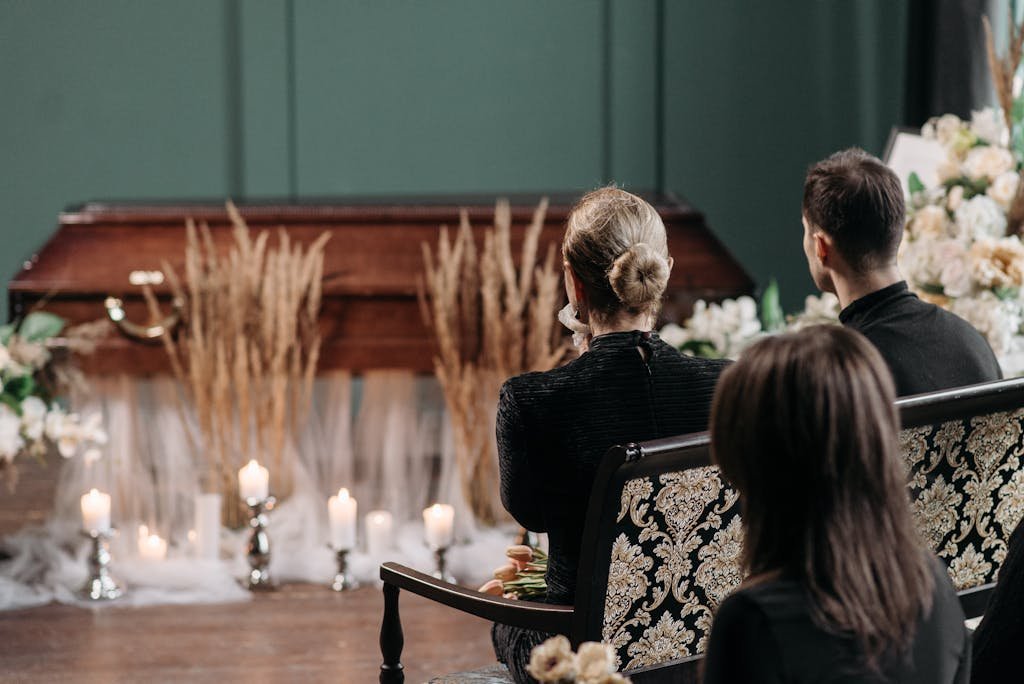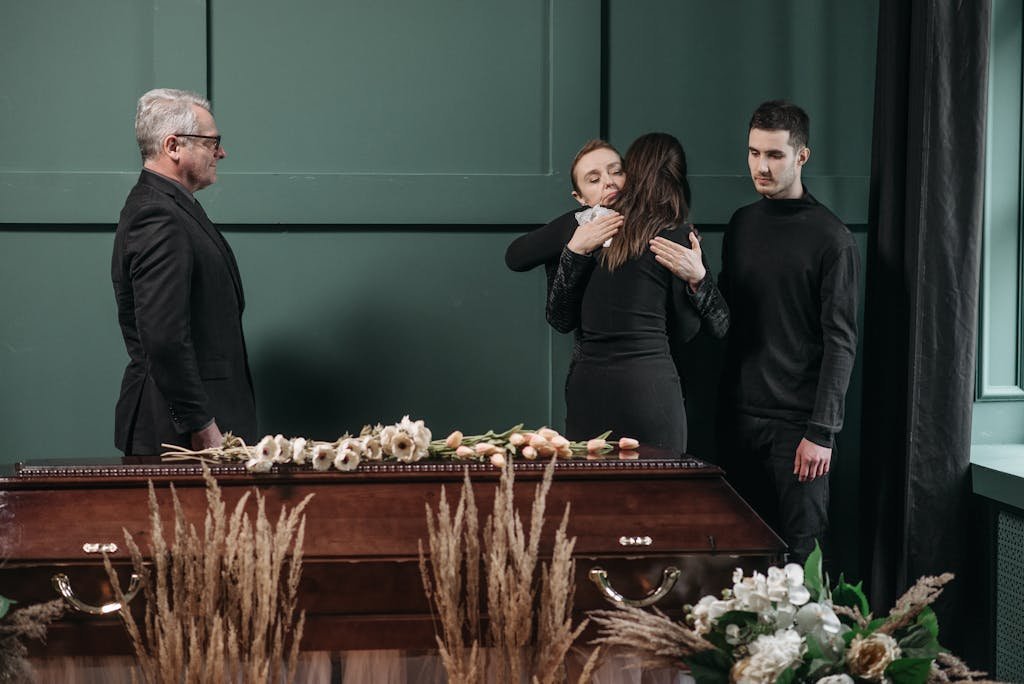What to Say at a Funeral
Knowing what to say at a funeral can be one of the most difficult social situations we face. The combination of grief, formality, and wanting to provide comfort while avoiding offense creates anxiety for many funeral attendees. Whether you’re greeting the family, giving a eulogy, or simply expressing condolences, finding appropriate words feels overwhelming during such an emotional time.
Understanding what to say at a funeral—and equally important, what not to say—helps you navigate this challenging experience with grace and compassion. The right words provide comfort to grieving families, honor the deceased’s memory, and demonstrate your support during one of life’s most difficult moments. While there’s no perfect script for every situation, certain phrases, approaches, and sentiments prove consistently meaningful and appropriate.
The Short Answer: What to say at a funeral includes simple, heartfelt condolences like “I’m so sorry for your loss,” sharing specific positive memories of the deceased, offering concrete help rather than vague “let me know if you need anything,” and keeping comments brief to allow others their turn. Avoid clichés like “they’re in a better place,” comparing losses, or asking insensitive questions.

What to Say at a Funeral: Basic Condolences
Simple and Appropriate Phrases to Say at a Funeral
When approaching the family, simple, sincere expressions provide comfort without overwhelming:
Classic Condolences:
- “I’m so sorry for your loss”
- “My deepest condolences to you and your family”
- “My heart goes out to you during this difficult time”
- “I’m thinking of you and your family”
- “Please accept my sincere sympathy”
These phrases work in virtually any situation. According to grief counselors at the American Psychological Association (https://www.apa.org), simple, direct expressions of sympathy are often most appropriate and comforting.
When You Knew the Deceased:
- “I’m so sorry about [name]—they were a wonderful person”
- “I have such fond memories of [name]”
- “[Name] meant a lot to me, and I’ll miss them”
- “I’m grateful I had the chance to know [name]”
Mentioning the deceased by name personalizes your condolences and shows genuine connection.
Acknowledging the Family’s Pain:
- “I know how much [name] meant to you”
- “I can’t imagine how difficult this must be”
- “This is such a tremendous loss”
- “I know [name] was so proud of you”
Religious Condolences (When Appropriate):
- “You and your family are in my prayers”
- “May God comfort you during this time”
- “May [name]’s memory be a blessing” (Jewish tradition)
- “I’m praying for peace and healing for your family”
Important Note: Only use religious language if you know the family shares those beliefs. When unsure, stick with secular condolences.
What to Say at a Funeral When Sharing Memories
Sharing brief, positive memories provides comfort:
Memory-Sharing Examples:
- “I’ll never forget when [name] [specific kind action]—it showed their generous spirit”
- “One of my favorite memories is [brief, appropriate story]”
- “[Name] always knew how to make people laugh/feel welcome/solve problems”
- “I learned so much from [name], especially about [positive quality]”
Tips for Sharing Funeral Memories:
- Keep stories brief (1-2 minutes maximum in receiving line)
- Choose positive, appropriate anecdotes
- Avoid embarrassing or controversial stories
- Focus on the deceased’s positive qualities
- Make the family the focus, not yourself
Rules for visiting cemeteries after the funeral reflect the same respect and consideration appropriate during the service.
What to Say at a Funeral: Offering Help
Specific Offers Better Than General Ones
Avoid Vague Offers: “Let me know if you need anything” or “Call me if I can help” place the burden on grieving people to identify needs and reach out. Most won’t.
Make Specific Offers at the Funeral:
- “I’d like to bring dinner next Tuesday—would that work?”
- “Can I mow your lawn this weekend?”
- “I’m happy to drive [children/elderly relatives] wherever they need to go”
- “I can help with [specific task] if that would be helpful”
- “Would it be okay if I called you next week to check in?”
Follow-Through is Essential: Only offer what you can actually do. Grief counselors note that broken promises during bereavement cause additional pain. According to research from the National Alliance for Grieving Children (https://childrengrieve.org), practical support proves most helpful during acute grief phases.
Longer-Term Support:
- “I’m planning to call you in a few weeks—grief doesn’t end when the funeral does”
- “I’d love to take you to lunch next month when things settle”
- “I’ll check in regularly over the coming months”
Respecting Declining: Some people need space. If they decline your offer, respect that boundary while leaving the door open: “I understand completely. Please don’t hesitate to reach out if you change your mind.”
What to Say at a Funeral About Practical Matters

Appropriate Practical Questions:
- “Do you have enough help with [specific need] right now?”
- “Has someone arranged [specific task that needs doing]?”
- “Would you like me to help coordinate [food/transportation/other specific need]?”
Inappropriate Practical Questions:
- “When will you go through their things?”
- “What are you going to do with the house?”
- “Are you going back to work soon?”
- Financial questions about the estate
Timing matters tremendously. Practical decisions can wait. The funeral focuses on honoring the deceased and supporting immediate emotional needs.
What NOT to Say at a Funeral
Common Phrases to Avoid at Funerals
Clichés That Minimize Grief:
- “They’re in a better place” (suggests deceased is better off dead)
- “It was God’s plan” (can anger those questioning their faith)
- “Time heals all wounds” (dismisses current pain)
- “At least they lived a long life” (suggests loss is less significant)
- “At least they didn’t suffer long” (focuses on wrong aspect)
- “Everything happens for a reason” (implies loss serves some purpose)
These phrases, while well-meaning, often feel dismissive to grieving families. The National Funeral Directors Association (https://www.nfda.org) advises avoiding platitudes that minimize loss.
Comparisons to Avoid:
- “I know exactly how you feel” (you don’t—grief is individual)
- “When my [relative] died, I…” (makes it about you)
- “At least you still have [other children/spouse/etc.]” (suggests deceased is replaceable)
- “You’re young, you’ll marry again” (inappropriate and insensitive)
Insensitive Questions:
- “How did they die?” (too invasive for funeral setting)
- “Were they sick long?” (private medical information)
- “Is there going to be an inheritance?” (shockingly inappropriate but asked more often than you’d think)
- “When are you having another baby?” (if child died)
Judgmental Comments:
- “You seem to be holding up well” (implies they should be more upset)
- “I’m surprised you’re not crying” (everyone grieves differently)
- “Aren’t you worried about [deceased’s soul/afterlife]?” (imposes religious beliefs)
- Comments about the deceased’s life choices or past conflicts
Humor and Jokes: While appropriate funny stories about the deceased can sometimes work, avoid:
- Jokes unrelated to the deceased
- Dark humor about death
- Inappropriate stories that embarrass the deceased or family
- Trying to “lighten the mood” with comedy
What happens to graves after 100 years and other long-term concerns are not appropriate funeral conversation topics.
What to Say at a Funeral When You’re Speaking or Giving a Eulogy
Preparing What to Say at a Funeral Speech
If you’ve been asked to speak at a funeral:
Eulogy Structure:
- Introduction (30 seconds)
- Thank attendees for coming
- Introduce yourself and your relationship to deceased
- Acknowledge the difficulty of the day
- Celebrating Their Life (2-4 minutes)
- Share 2-3 meaningful stories
- Highlight positive qualities and achievements
- Focus on impact they had on others
- Include appropriate humor if it reflects their personality
- Acknowledging the Loss (1 minute)
- Recognize the pain of loss
- Express empathy for family
- Note how they’ll be missed
- Conclusion (30 seconds)
- Final tribute or meaningful quote
- Thank family for sharing them with others
- Closing sentiment about memory/legacy
Total Length: 4-6 minutes typically appropriate
Eulogy Content Tips:
- Write it out and practice (emotions run high—having text helps)
- Include specific details (general praise feels hollow)
- Balance sadness with celebration
- Consider audience appropriateness
- Have backup speaker ready in case emotions overwhelm you
Opening Lines for Funeral Speeches:
- “We gather today to honor [name], who touched so many lives…”
- “Thank you all for being here to celebrate [name]’s life…”
- “[Name] would be humbled to see this gathering of people who loved them…”
- “Though this is a day of sorrow, it’s also a day to remember [name]’s remarkable life…”
Closing Lines for Funeral Speeches:
- “Though [name] is no longer with us, their impact remains in each of us…”
- “We will carry [name]’s memory and lessons forward…”
- “[Name], you will be deeply missed but never forgotten…”
- “May we honor [name]’s memory by living as they taught us…”
What to Say at a Funeral When You Didn’t Know the Deceased Well
Honoring Someone You Barely Knew:
- “Though I didn’t know [name] well, I could see how much they meant to you”
- “It’s clear from everyone here how special [name] was”
- “Thank you for including me in this important day”
- “[Name] clearly had a positive impact on many people”
When You’re There for the Family Member:
- “I’m here for you, my friend”
- “I wanted to support you during this difficult time”
- “I’m so sorry you’re going through this loss”
This honesty shows genuine support without pretending closer connection than existed.
What to Say at a Funeral: Different Relationships
What to Say at a Funeral to a Spouse
Condolences for a Widow/Widower:
- “I’m so sorry for the loss of your husband/wife”
- “[Name] was so lucky to have you, and you two had something special”
- “The love you shared was beautiful to witness”
- “I can’t imagine losing the love of your life”
- “Your partnership was inspiring”
Long-Term Support: Widows and widowers particularly need ongoing support after the funeral, as their grief often intensifies once everyone else goes home.
What to Say at a Funeral to a Parent
Condolences for Losing a Child: This represents one of life’s most devastating losses:
- “I’m so deeply sorry for the loss of your child”
- “No words can express how heartbreaking this is”
- “[Child’s name] was so lucky to have you as a parent”
- “I’m here for you, no matter what you need”
What to Avoid:
- “You can have another baby” (children aren’t replaceable)
- “At least you have other children” (doesn’t lessen this loss)
- “It was meant to be” (never say this about a child’s death)
- “They’re an angel now” (can be hurtful, not comforting)
What to Say at a Funeral to Someone Who Lost a Parent
Condolences for Losing a Parent:
- “I’m so sorry about your mom/dad”
- “Your mother/father was such a wonderful person”
- “I know how close you were to your dad/mom”
- “Losing a parent is incredibly difficult”
Sharing Memories:
- “Your mom/dad always spoke so proudly of you”
- “I remember when your father [positive memory]”
- “Your mother had such a [positive quality]”
How much does it cost to be buried concerns the family, but financial questions are inappropriate funeral conversation.
What to Say at a Funeral to a Friend
Supporting a Friend at a Funeral:
- “I’m here for you, whatever you need”
- “I love you and I’m not going anywhere”
- “You don’t have to be strong right now—I’ve got you”
- “I’m coming over this week with food/to help/to just be with you”
Close friends can offer more intimate support and be more direct about providing help.
What to Say at a Funeral: Cultural and Religious Considerations
What to Say at Different Types of Funerals
Catholic Funeral Condolences:
- “May their soul rest in peace”
- “I’m praying for you and your family”
- “May God grant you comfort and peace”
Jewish Funeral Condolences:
- “May their memory be a blessing”
- “I’m so sorry for your loss”
- “May you be comforted among the mourners of Zion and Jerusalem” (traditional)
Muslim Funeral Condolences:
- “Inna lillahi wa inna ilayhi raji’un” (To Allah we belong and to Him we return—if you’re Muslim)
- “I’m deeply sorry for your loss”
- “May Allah grant them Jannah”
Buddhist Funeral Condolences:
- “May you find peace during this difficult time”
- “I’m so sorry for your loss”
- “Sending you compassion and strength”
Non-Religious Funeral Condolences:
- Focus on memories, impact, and legacy
- Avoid religious references
- Emphasize human connection and shared grief
- “They will live on in our memories”
When Unsure of Religious Affiliation: Stick with universal phrases: “I’m so sorry for your loss” and “I’m thinking of you” work across all traditions.
What to Say at a Funeral: After the Service

Following Up After the Funeral
The real support often matters most after the funeral when everyone else has left:
One Week After:
- “I’ve been thinking about you—how are you doing?”
- “I wanted to check in and see how you’re holding up”
- “Would you like company, or would you prefer space right now?”
One Month After:
- “I know it’s been a month—are you doing okay?”
- “I remember you mentioning [specific concern]—how did that work out?”
- “Would you like to [specific activity] together?”
Ongoing Support:
- Acknowledge difficult “firsts” (first birthday, holiday, anniversary without deceased)
- Continue checking in every few weeks
- Remember the deceased on their birthday or death anniversary
- Don’t avoid mentioning the deceased—hearing their name can be comforting
According to the Center for Complicated Grief at Columbia University (https://complicatedgrief.columbia.edu), ongoing social support significantly affects grief outcomes.
What to Say in Sympathy Cards After the Funeral
Written Condolences: Cards provide opportunity for more thoughtful expression:
Card Message Components:
- Direct condolence (“I’m so sorry for your loss”)
- Personal memory or positive comment about deceased
- Acknowledgment of the impact on recipient
- Offer of support or prayer
Example Sympathy Card Messages:
- “I was heartbroken to hear about [name]. They had such a positive impact on my life through [specific example]. I’m thinking of you during this incredibly difficult time and am here if you need anything.”
- “My deepest condolences on the loss of your [relationship]. I will always remember [name]’s [positive quality] and [specific memory]. Please know you’re in my thoughts.”
- “[Name] was one of the kindest people I’ve known. The world is diminished by their absence, and my heart goes out to you. I’m here to support you however I can.”
Timing: Mail cards within a week of learning about the death. The family may receive dozens immediately after, so cards arriving weeks later show ongoing remembrance.
Common Questions About What to Say at a Funeral
What if I start crying while speaking at the funeral?
It’s completely acceptable and expected. Pause, take a breath, and continue if able. Have someone nearby who can finish if you become too emotional. Families appreciate authentic emotion—it shows genuine love and connection.
How long should you stay at a funeral or visitation?
At visitation, 15-30 minutes is typical unless you’re very close to the family. At the funeral service, stay for the entire service. At post-funeral gatherings, 30-60 minutes is appropriate unless you’re close family or specifically asked to stay longer.
What if you don’t know what to say at a funeral?
It’s perfectly acceptable to say, “I don’t know what to say, but I wanted to be here to support you.” Physical presence matters more than perfect words. A hug, hand squeeze, or simply sitting with someone speaks volumes.
Can you say the deceased’s name at a funeral?
Yes, absolutely. Many grieving people find comfort in hearing their loved one’s name. Saying “your mom” instead of her name can feel impersonal. Use the deceased’s name naturally in conversation.
What if someone asks you to speak at a funeral and you’re uncomfortable?
It’s okay to decline if you’re not comfortable or able to speak. Simply explain: “I’m honored you asked, but I don’t think I could get through it without breaking down” or “I’d prefer to honor [name] privately.” Suggest someone else who might be appropriate.
Should you bring children to a funeral?
This depends on the child’s age, the family’s preference, and the situation. If bringing children, prepare them for what to expect and have a plan for leaving if they become disruptive. What to bring when visiting a grave includes considerations for bringing children to cemetery visits after funerals.
What if you can’t attend the funeral?
Send a sympathy card, make a donation in the deceased’s name, call or text the family with condolences, offer specific help remotely, or ask if you can visit after the funeral passes. Missing the funeral doesn’t mean you can’t show support.
The Bottom Line on What to Say at a Funeral
What to say at a funeral comes down to authenticity, brevity, and compassion. Simple, heartfelt condolences like “I’m so sorry for your loss” combined with a brief positive memory or specific offer of help provides meaningful comfort without overwhelming grieving families. The most important thing isn’t finding perfect words—it’s showing up, being present, and demonstrating that you care.
Can you visit any cemetery to pay respects after funerals, and maintaining those connections through cemetery visits demonstrates ongoing support. Do you have to be embalmed and other logistical decisions matter to families planning services, but your role as attendee focuses on emotional support rather than logistics.
Remember that grief doesn’t end when the funeral does. Following up in the weeks and months after may matter even more than what you say at the funeral itself. The most powerful support combines presence at the funeral, appropriate words of comfort, concrete help, and ongoing connection as the bereaved navigate life without their loved one.
Your willingness to show up during one of life’s most difficult moments—even if you’re uncertain what to say—means more to grieving families than perfect words ever could. Approach funerals with compassion, respect, and genuine care, and your words will provide the comfort you hope to give.
